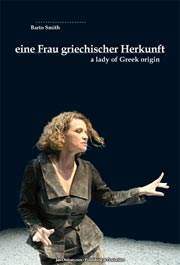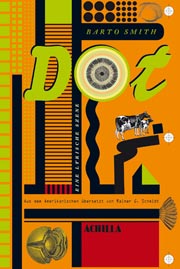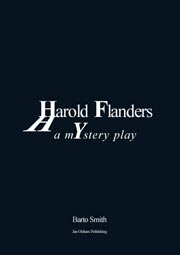A lady of Greek origin (Book + DVD)

Content
Barto tells in thirty-one poems the story of a drug-addicted, divorced American woman “of Greek origin.” Following the sudden death of her three children, the lady opts for the life of a transient in the streets of European cities, curiously keeping company with only a few favorite books of classical literature.
The thirty-one poems of a lady of Greek origin are written in a very new and unique musical way. They comprise the impression on thirty-one stones, or ceremonial “steles,” of 3,367 such granite constructions to be arrayed at Barto’s estate in Eustis, Florida. On the faces of these will be various poems and chapters of novels already completed – a seventeen-year writing project of immense calculation and proportion.
about the stage version 2005
“Where poetry finds fitting images and is made of simple beauty, …” (Frankfurter Allgemeine)
“Bettina Kaminski’s performance of the monologue, a linguistic tour de force, is meticulous, exciting, haunting.” (Kronenzeitung)
” … allows Barto’s poetry to flourish in a no-nonsense staging . . .” (Frankfurter Neue Presse)
Dot – A lyrical szene

Content
Barto Smith (aka. the world-class American pianist Tzimon Barto) tells the story a story of compulsive repetition in the novella “DOT. A lyrical scene”.
Every year, Dot takes a panicked drive from Eustis to Orlando, Florida, to prevent her imaginary daughter Cathy from having an abortion, which Dot had herself years ago (which she calls the assurance of the non-existence of Cathy). At the end of each trip (also imaginary?), Dot finds herself in reconciliation with her husband, Clarence. The progress of the vicious circle is ensured, the circuit is closed, and the unity of space, time and place is preserved.
“DOT” is published here as a first edition in German, the original English version has not yet been published.
Harold Flanders

Content
Harold Flanders was not one to burn nor, far as he knew, had Harold ever been burned.
Of sundry laboratory techniques adopted by .0001 percent presumably heterosexual males in the United States who, having squeezed past the half-century mark, are as virgin as a molecule of oxygen that has yet to be kineticized by a black one of carbon, Harold’s caramelizations were of the more neo-Victorian, crystalline sort he irenically served mamà, Sunday afternoons, on cool patens of Cherry Blossom Pink Depression glass plates, before a bouquet of copious gladiolas arranged in the same vase same way same table same room same house same hour since Harold’s childhood.
Now, even flora perspire. Nevertheless, this love thing, or rather, devotion twixt the two was so subtle that if you’d thrown rice at them one time, water, wine, say – food coloring, another – alright, any such thing the chemist might employ to discover just what the arrangement could be (I mean between Harold and his mother, not the flowers) – you’d still have been at a loss to realize any formula for what you’d conjectured the two of necessity must express, save that of a widowed mother, stout seventy, and her fifty-one-year-old bachelor son: Harold Flanders. Basta. That is all there is to know. FINIS. (And all ye need to know.)